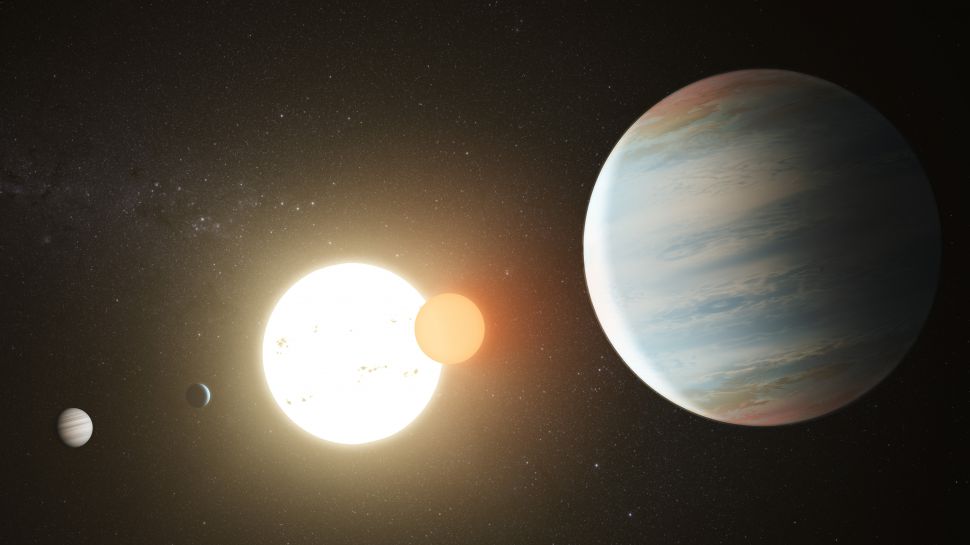A new 'puffy' planet has been discovered in the Kepler-47 system

A free daily email with the biggest news stories of the day – and the best features from TheWeek.com
You are now subscribed
Your newsletter sign-up was successful
Kepler-47 is a 3.5-billion-year-old star system about 3,340 light years away from Earth. It's one of nine systems that we know of that are "binary star systems," which means it has not one star at its heart, but two. And it's the only one we know that has two planets orbiting around it: Kepler-47b and Kepler-47c.
Well, make that three.
Scientists have officially confirmed the existence of a third planet orbiting the binary stars of Kepler-47, and have appropriately dubbed it Kepler-47d, Space reported. The newly discovered planet is about seven times bigger than Earth, making it the largest planet in its system, roughly double the size of Kepler-47b and c.
The Week
Escape your echo chamber. Get the facts behind the news, plus analysis from multiple perspectives.

Sign up for The Week's Free Newsletters
From our morning news briefing to a weekly Good News Newsletter, get the best of The Week delivered directly to your inbox.
From our morning news briefing to a weekly Good News Newsletter, get the best of The Week delivered directly to your inbox.
The discovery, announced in The Astronomical Journal on Tuesday, is big news for the team that discovered it. Kepler-47d's orbit lies in between Kepler-47b's and Kepler-47c's, even though scientists theorized that any additional planets would be found further away from the stars.
The Kepler-47 trio is helping scientists learn about so-called "puffy" planets, which are gas planets with a large size but a very low density. Even the puffiest planet in our solar system, Saturn, is much denser than any of the Kepler planets. The information we can learn about them will help us understand more of the "loosely packed, low-density planets" in our solar system, said Jonathan Fortney, an astronomer at the University of California, Santa Cruz. Read more at Space.
A free daily email with the biggest news stories of the day – and the best features from TheWeek.com
Shivani is the editorial assistant at TheWeek.com and has previously written for StreetEasy and Mic.com. A graduate of the physics and journalism departments at NYU, Shivani currently lives in Brooklyn and spends free time cooking, watching TV, and taking too many selfies.
-
 6 of the world’s most accessible destinations
6 of the world’s most accessible destinationsThe Week Recommends Experience all of Berlin, Singapore and Sydney
-
 How the FCC’s ‘equal time’ rule works
How the FCC’s ‘equal time’ rule worksIn the Spotlight The law is at the heart of the Colbert-CBS conflict
-
 What is the endgame in the DHS shutdown?
What is the endgame in the DHS shutdown?Today’s Big Question Democrats want to rein in ICE’s immigration crackdown
-
 The 5 biggest astronomy stories of 2025
The 5 biggest astronomy stories of 2025In the spotlight From moons, to comets, to pop stars in orbit
-
 Blue Origin launches Mars probes in NASA debut
Blue Origin launches Mars probes in NASA debutSpeed Read The New Glenn rocket is carrying small twin spacecraft toward Mars as part of NASA’s Escapade mission
-
 Dinosaurs were thriving before asteroid, study finds
Dinosaurs were thriving before asteroid, study findsSpeed Read The dinosaurs would not have gone extinct if not for the asteroid
-
 Panspermia: the theory that life was sent to Earth by aliens
Panspermia: the theory that life was sent to Earth by aliensUnder The Radar New findings have resurfaced an old, controversial idea
-
 SpaceX breaks Starship losing streak in 10th test
SpaceX breaks Starship losing streak in 10th testspeed read The Starship rocket's test flight was largely successful, deploying eight dummy satellites during its hour in space
-
 Rabbits with 'horns' sighted across Colorado
Rabbits with 'horns' sighted across Coloradospeed read These creatures are infected with the 'mostly harmless' Shope papilloma virus
-
 Lithium shows promise in Alzheimer's study
Lithium shows promise in Alzheimer's studySpeed Read Potential new treatments could use small amounts of the common metal
-
 Scientists discover cause of massive sea star die-off
Scientists discover cause of massive sea star die-offSpeed Read A bacteria related to cholera has been found responsible for the deaths of more than 5 billion sea stars